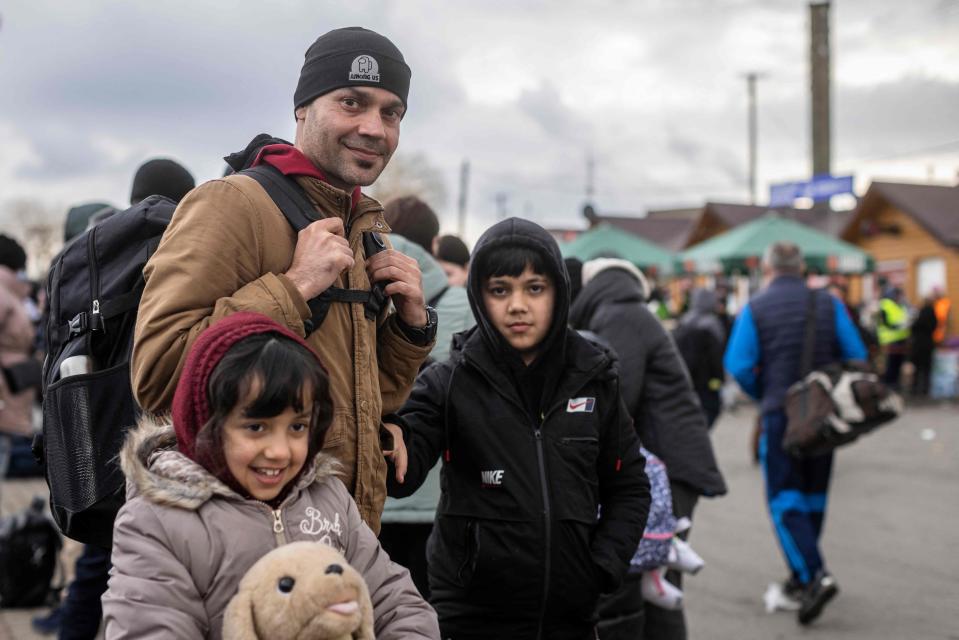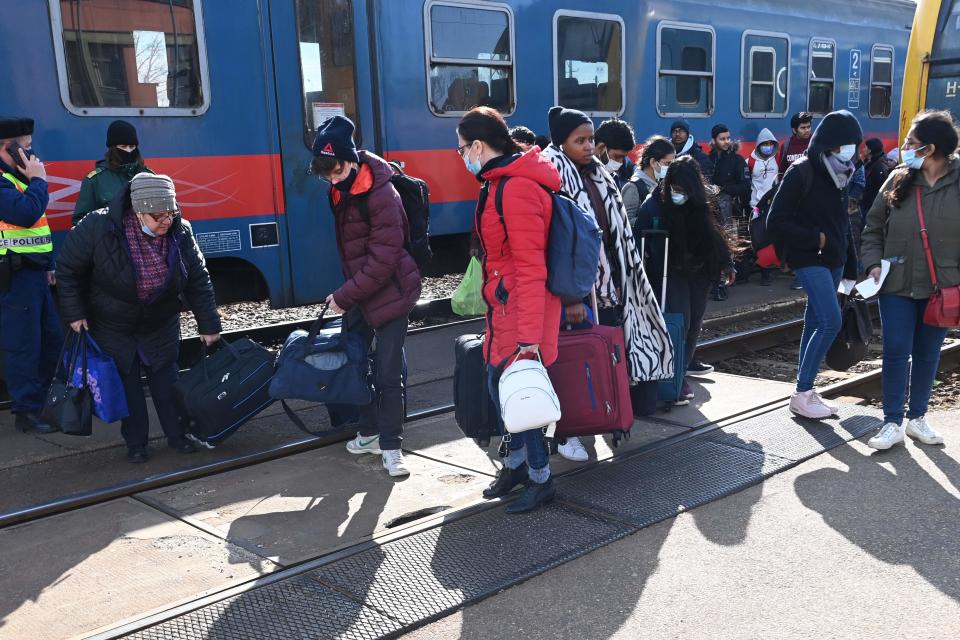Opinion: Plight of Ukrainian refugees should make us show more compassion to everyone fleeing
- Oops!Something went wrong.Please try again later.
More than 1 million Ukrainians have become refugees in a matter of a week, as Russian President Vladimir Putin continues his appalling attack on Ukraine. Meanwhile, a bevy of countries – including Poland, Slovakia, Croatia and Romania – have risen to the occasion, offering shelter, health care, employment and a helping hand for these innocent families forced to start life anew.
This warm welcome for Ukrainian refugees is a glimmer of light amid one of the most somber weeks in recent memory. We should all applaud the countries that have heeded the call to provide a haven, that have resurfaced humanity’s better angels while the world seems embroiled in unimaginable evil and pain.
'Otherizing' refugees who don't look like you
At the same time that we honor the embrace of Ukrainian refugees, though, we shouldn’t pass up the opportunity to reflect on a broader, more troubling narrative now permeating international discourse – a narrative about which refugee experiences ought to stir up our deepest sense of compassion.
Ukraine war diary: 'If we lose Kyiv, we lose everything. We will lose the nation.'
A few days ago, while viewing images of Ukrainians attempting to escape the country, a broadcast journalist proclaimed, “What’s compelling is just looking at them, the way they’re dressed. … These are prosperous, middle-class people. These are not obviously refugees trying to get away from areas in the Middle East that are still in a big state of war. These are not people trying to get away from areas in North Africa. They look like any European family that you would live next door to.”
This rhetoric – "otherizing" people who’ve similarly sought safety from war but just happen to bear different nominal descriptors – is a cautionary tale about using superficial likeness as a prerequisite for compassion. A refugee need not look the same, dress the same or live next door to evoke our same desire to help.

The dreams of an Afghan refugee parent are fundamentally reflected in the aspirations of each Ukrainian parent now searching for a sanctuary to rebuild their children’s lives. The Syrian refugee dentist forced to uproot their existence shares the loss felt by a Ukrainian refugee having to leave behind a beloved small business.
Humans of all backgrounds seeking peace amidst turmoil should find, at the end of that long tunnel, our outstretched hand of support.
David Rothkopf: Thermobaric weapons. Targeting hospitals. Case against Putin as a war criminal is strong.
Many Afghans who fled the Taliban’s brutal takeover last year – though facing a conspicuously icy reception in their own search for refuge – have nonetheless joined in mourning for the Ukrainians being displaced from their homes.
In a recent interview in the Boston Globe about Ukraine, one Afghan refugee who moved to America months ago noted, “It’s the same situation we had in my country. I am very sad and very upset about it.”
Rally behind all people fleeing violence and danger
This display of unity, which underscores the core commonalities that span the refugee experience, should awaken our resolve to rally behind all people fleeing violence and danger.

The more we legitimize the plight of our in-group while neglecting others’, the further we recede from recognizing just how intertwined our collective fates really are. Our linked fates, especially during crises where all humans are simply seeking safety, are even more critical to acknowledge as new allegations emerge about how foreign nationals in Ukraine are being denied access to border crossings.
An African woman studying at a Ukrainian medical school told CNN she was removed from a bus headed to Poland and instructed to walk instead, while she witnessed bus after bus transporting Ukrainians.
Other foreign nationals describe being continually demoted to the back of border crossing lines and threatened with physical violence from guards, prompting the African Union to raise concerns about the “unacceptable dissimilar treatment” of peoples escaping Ukraine.
Austin Bogues: Is there a chance Ukraine wins? Former NATO Supreme Allied Commander Wes Clark answers.
It’s times like these when we must reassert that Putin’s invasion places both Ukrainians and foreign nationals living in Ukraine in the same life-or-death predicament, as missiles rain down indiscriminately.
So, too, it’s times like these when we must reaffirm that the decimation of homelands, livelihoods and dreams is unequivocally tragic and compelling, no matter which groups of refugees it happens to or where.
Henna Hundal (@hennahundal) is a public policy specialist and a researcher at the Stanford University School of Medicine. Simran Jeet Singh (@simran) is the executive director of the Aspen Institute's Religion & Society Program.
You can read diverse opinions from our Board of Contributors and other writers on the Opinion front page, on Twitter @usatodayopinion and in our daily Opinion newsletter. To respond to a column, submit a comment to letters@usatoday.com.
This article originally appeared on USA TODAY: Opinion: Ukraine refugees fleeing Russia invasion reflect all refugees

